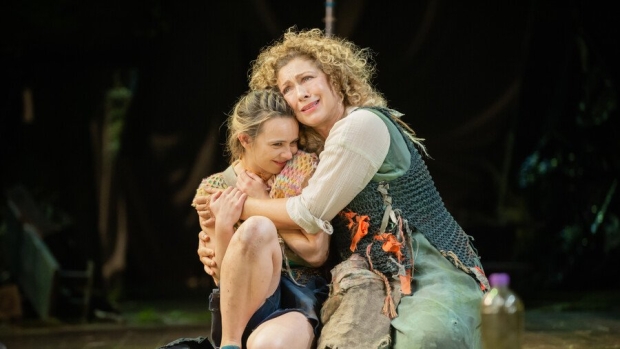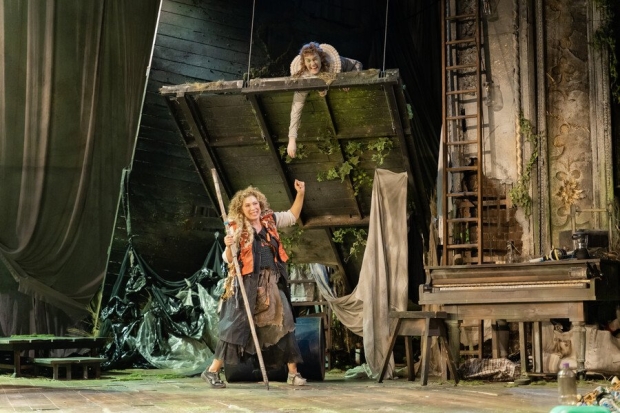RSC’s ”The Tempest” starring Alex Kingston and Jessica Rhodes – review

© RSC/Ikin Yum
More on the gender-swapping Duke in a moment, but let’s deal with the idiotic accusations of “wokeness” first. Some inane howlers have complained that the use of recycled materials, props and costumes in an attempt to improve the production’s carbon footprint has turned it into an embarrassing left-wing crusade that somehow distorts or denigrates the Bard. Like much “anti-woke” polemic, this is tosh.
Can anyone in 2023 seriously criticise any effort to protect and preserve the planet? But perhaps more pertinently, the claim is unfounded in any case, as not only is this firmly not a climate-change Tempest, but the set and design are among the most engaging components of the show. Tom Piper has created an aesthetic that is defiantly downbeat in its use of discarded plastic and reclaimed wood and yet manages to look both beautiful and sumptuous, in a dilapidated kind of way.

© RSC/Ikin Yum
It’s hard to know how much director Elizabeth Freestone wanted to embed the climate change message in her version. The reality is that, despite the litter-picking, recycling and homemade aspects of the design, this is a play that is mainly about things quite other than the weather – parenthood and servitude, for starters. Hanging a climate change agenda on the hooks of Shakespeare’s storms, floods and natural disasters is always going to be tenuous at best.
So instead we get a solid, if rather mundane, rendition of a play that should be brimful of wonder. There’s little awe or amazement in the strangeness that Prospero weaves about her and her daughter – indeed, for the most part she seems as much at the mercy of the elements as everyone else in the play – while the inherent magic of the verse is all but imperceptible in the workmanlike delivery of most of the cast.
Heledd Gwynn manages to find something ethereal in the sprite Ariel, and Tommy Sim’aan’s Caliban has both clarity and presence. Elsewhere, the villains Alonso (Peter de Jersey), Sebastian (Grace Cookey-Gam) and especially Antonio (Jamie Ballard) do a lot of the heavy lifting in regard to the gravitas and poetry of the production.
As for Kingston herself, she’s obviously terrific, but surprisingly low-key in her portrayal of the wronged Duke of Milan. Freestone’s liberality with gender, while not a problem in itself, is laced with inconsistencies: the Duke is reframed as a woman and a mother yet inexplicably retains her masculine title. Kingston favours the maternal aspects of her role, which imbues Prospero with insight and freshness, but she seems much less foregrounded than usual, with less enchantment and agency as a result.
It’s an interesting take and not without its impressive qualities – soak up that exotic set, for one thing. Just don’t believe the nonsense that you’ll hear talked about it.













